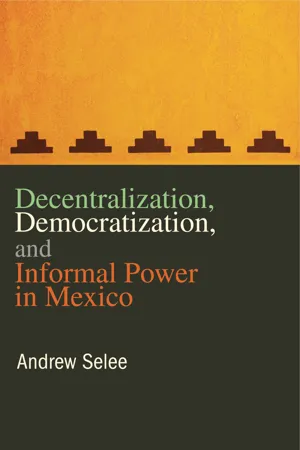
- English
- PDF
- Available on iOS & Android
Decentralization, Democratization, and Informal Power in Mexico
About this book
In the last two decades of the twentieth century, many countries in Latin America freed themselves from the burden of their authoritarian pasts and developed democratic political systems. At the same time, they began a process of shifting many governmental responsibilities from the national to the state and local levels. Much has been written about how decentralization has fostered democratization, but informal power relationships inherited from the past have complicated the ways in which citizens voice their concerns and have undermined the accountability of elected officials. In this book, Andrew Selee seeks to illuminate the complex linkages between informal and formal power by comparing how they worked in three Mexican cities. The process of decentralization is shown to have been intermediated by existing spheres of political influence, which in turn helped determine how much the institution of multiparty democracy in the country could succeed in bringing democracy "closer to home."
Frequently asked questions
- Essential is ideal for learners and professionals who enjoy exploring a wide range of subjects. Access the Essential Library with 800,000+ trusted titles and best-sellers across business, personal growth, and the humanities. Includes unlimited reading time and Standard Read Aloud voice.
- Complete: Perfect for advanced learners and researchers needing full, unrestricted access. Unlock 1.4M+ books across hundreds of subjects, including academic and specialized titles. The Complete Plan also includes advanced features like Premium Read Aloud and Research Assistant.
Please note we cannot support devices running on iOS 13 and Android 7 or earlier. Learn more about using the app.
Information
Table of contents
- 00 Front_Selee
- 01 Chapter 1_Selee
- 02 Chapter 2_Selee
- 03 Chapter 3_Selee
- 04 Chapter 4_Selee
- 05 Chapter 5_Selee
- 06 Chapter 6_Selee
- 07 Chapter 7_Selee
- 08 Index_Selee.pdf